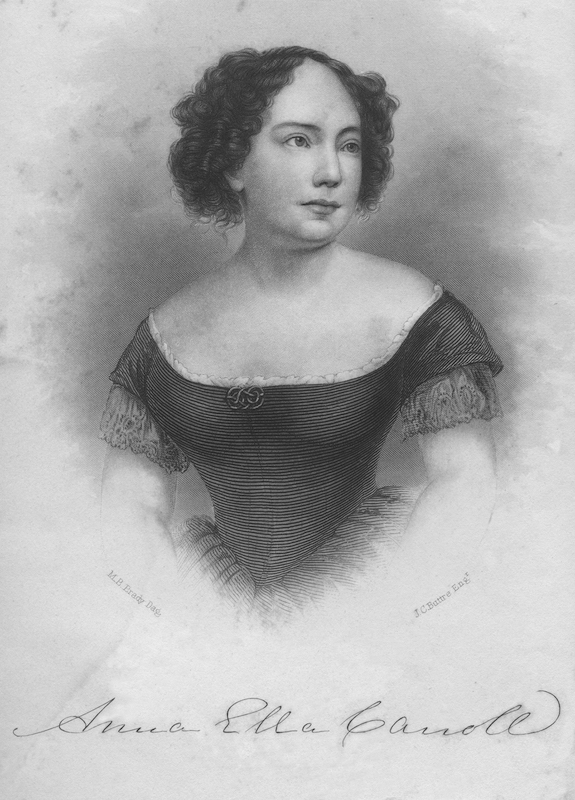
This piece is part of an ongoing series on the unsung women of history. Read more here.
Why would a woman fight to participate in a political process that purposely excluded her? How could a slave-owning Southerner become a staunch Lincoln supporter and, eventually, his trusted adviser? Did she really help plan one of the Civil War’s most successful campaigns? When it comes to Anna Ella Carroll, there are more questions than answers—and therein lies the fascination of this largely forgotten woman.
Politics ran in Carroll’s blood. A cousin signed the Declaration of Independence; her father was governor of Maryland. Born in 1815, she grew up in a world of debate about issues that threatened to tear the United States apart, and chose sides early. Despite arguments that Maryland should secede from the Union, she was staunchly pro-Union. And despite the fact that women had no ability to directly participate in the political system, Carroll quickly found a way to take part anyway.
Advances in printing and transportation made it easier than ever before to spread new ideas and opinions. And Carroll had plenty of opinions. Unlike many women of her day, Carroll had been broadly educated. She put that education and her love of the written word to work on behalf of her favorite political causes, writing anonymous letters to editors of influential newspapers of the day expressing her political views. She also flexed her political acumen on her father’s behalf. He only served as governor of Maryland for one term and afterward lost most of his fortune in the financial panic of 1837. Carroll became a kind of combination secretary, social guide and lobbyist for her father, flexing her society connections to keep his name relevant and advising him confidently on political issues of the day.
She may have been unable to vote, but Carroll held her own politically. She turned her ability to convince others into a career, becoming a professional lobbyist on behalf of railroad companies and acting as an early version of a press agent for her friend, Maryland’s new governor Thomas Hicks. She also helped found an entire political party, aligning herself with the pro-Union American Party. (Like her fellow Know-Nothings, Carroll was vehemently anti-Catholic). By the time the Civil War began, she was a trusted adviser to Hicks and a widely-read political voice in her own right.
Get your history fix in one place: sign up for the weekly TIME History newsletter
Given Carroll’s support of a vehemently “nativist,” racist political party and her ownership of slaves, it seems bizarre that she supported President Lincoln. But Carroll was a woman of strange contrasts. She overcame her initial resistance to his presidency, freed her own slaves and devoted herself to what she saw as his Constitutional right and duty to suppress the rebels in the South. Maryland, itself a Southern state, was anything but pro-Lincoln or anti-slavery. The state was so divided that Hicks (himself a slaveholder) dragged his feet on the secession question. Until, that is, Carroll convinced him that secession wasn’t a good move for Maryland—an act of persuasion Hicks later compared to a crewman stepping in to steer a ship while his captain was in trouble.
Difficult, outspoken and sly, Carroll eventually gained even the president’s trust at a time when having an official woman cabinet member was unthinkable. The President was so enthusiastic about her writing that he secured government funding for a 50,000-run printing of one of her most influential pamphlets and invited her to the White House for a confidential interview. He was impressed and enlisted her as an unofficial adviser. Her advice was so valuable to the president that she was even “painted in” to a portrait of the reading of the Emancipation Proclamation in absentia, represented only by an empty chair covered in her writings.
But Carroll didn’t always play nice with the government. Accounts differ as to whether she really helped Lincoln and his advisers come up with the Tennessee River Campaign, which brought Union soldiers into Southern territory at last, long before its execution. She, though, laid claim to the victory and demanded it be recognized, fighting for the remainder of her life for official recognition and even a pension for her services. Lincoln himself objected, calling it “the most outrageous [claim] ever made to any government on earth.” Carroll, however, insisted that her intellectual labor be rewarded. Unlike most other battles in her life, she lost.
Was Carroll a self-interested woman or a martyr to a nation that would rather deny her due than admit a woman helped win the war? That depends on whom you ask—if the person you ask remembers Carroll’s name at all. Perhaps Carroll’s epitaph speaks best about her unusual life and rare talents: “A woman rarely gifted.”
More Must-Reads from TIME
- Cybersecurity Experts Are Sounding the Alarm on DOGE
- Meet the 2025 Women of the Year
- The Harsh Truth About Disability Inclusion
- Why Do More Young Adults Have Cancer?
- Colman Domingo Leads With Radical Love
- How to Get Better at Doing Things Alone
- Michelle Zauner Stares Down the Darkness
Contact us at letters@time.com